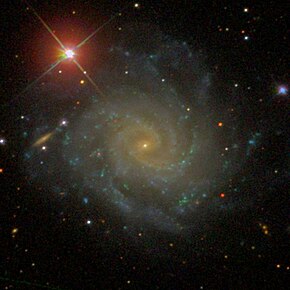NGC 5885
| NGC 5885 | |
|---|---|
 NGC 5885 as seen by the Sloan Digital Sky Survey (SDSS) | |
| Observation data (J2000 epoch) | |
| Constellation | Libra |
| Right ascension | 15h 15m 03s |
| Declination | -10° 05′ 09″ |
| Redshift | 0.006671 |
| Heliocentric radial velocity | 2,000 km/s |
| Distance | 105 Mly (32.23 Mpc) |
| Apparent magnitude (V) | 11.8 |
| Apparent magnitude (B) | 12.3 |
| Surface brightness | 23.37 mag/arcsec2 |
| Characteristics | |
| Type | SAB(r)c |
| Size | 3.5' x 3.1' |
| Other designations | |
| IRAS 15123-0954, PGC 54429, MCG -02-039-013 | |
NGC 5885 is an intermediate barred spiral galaxy located in the constellation Libra. Its speed relative to the cosmic microwave background is 2,185 ± 13 km/s, which corresponds to a Hubble distance of 32.3 ± 2.3 Mpc (~105 million ly).[1] NGC 5885 was discovered by German-British astronomer William Herschel in 1784.[2]
The luminosity class of NGC 5885 is III and it has a broad HI line. It also contains regions of ionized hydrogen.[1] With a surface brightness equal to 14.39 mag/am2, we can qualify NGC 5885 as a low surface brightness galaxy (LSB). LSB galaxies are diffuse galaxies with a surface brightness less than one magnitude lower than that of the ambient night sky.[3]
To date, 11 non-redshift measurements yield a distance of 22.055 ± 5.687 Mpc[4] (~71.9 million ly),[5] which is outside the distance values of Hubble. Note that it is with the average value of independent measurements, when they exist, that the NASA/IPAC database calculates the diameter of a galaxy and that consequently the diameter of NGC 5885 could be approximately 37, 5 kpc (~122,000 ly) if we used the Hubble distance to calculate it.
See also
[edit]References
[edit]- ^ a b "By Name | NASA/IPAC Extragalactic Database". ned.ipac.caltech.edu. Retrieved 2024-06-06.
- ^ "New General Catalog Objects: NGC 5850 - 5899". cseligman.com. Retrieved 2024-06-06.
- ^ "Data from revised NGC and IC Catalogue by Wolfgang Steinickle, NGC 5800 to 5899". astrovalleyfield.ca. Retrieved 2024-06-07.
- ^ "HyperLeda -object description". atlas.obs-hp.fr. Retrieved 2024-06-06.
- ^ "NED Query Results for NGC 5875". ned.ipac.caltech.edu. Retrieved 2024-06-06.
